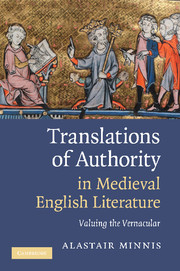Book contents
- Frontmatter
- Contents
- Preface
- List of abbreviations
- Introduction: valuing the vernacular
- Chapter 1 Absent glosses: the trouble with Middle English hermeneutics
- Chapter 2 Looking for a sign: the quest for Nominalism in Ricardian poetry
- Chapter 3 Piers's protean pardon: Langland on the letter and spirit of indulgences
- Chapter 4 Making bodies: confection and conception in Walter Brut's vernacular theology
- Chapter 5 Spiritualizing marriage: Margery Kempe's allegories of female authority
- Chapter 6 Chaucer and the relics of vernacular religion
- Notes
- Bibliography
- Index
Chapter 2 - Looking for a sign: the quest for Nominalism in Ricardian poetry
Published online by Cambridge University Press: 30 June 2009
- Frontmatter
- Contents
- Preface
- List of abbreviations
- Introduction: valuing the vernacular
- Chapter 1 Absent glosses: the trouble with Middle English hermeneutics
- Chapter 2 Looking for a sign: the quest for Nominalism in Ricardian poetry
- Chapter 3 Piers's protean pardon: Langland on the letter and spirit of indulgences
- Chapter 4 Making bodies: confection and conception in Walter Brut's vernacular theology
- Chapter 5 Spiritualizing marriage: Margery Kempe's allegories of female authority
- Chapter 6 Chaucer and the relics of vernacular religion
- Notes
- Bibliography
- Index
Summary
Those who do not believe in Jesus Christ, declares Walter Hilton, are not eligible for the benefits made possible by His passion. Throughout time, no one was ever saved, nor will be saved, except through belief in Christ and His coming. He proceeds to attack certain men who ‘gretli and grevousli erren’ by saying that ‘Jewis and Sarcenys and paynemes’, who lack such faith, may nevertheless be saved. This erroneous view is described in terms which make it perfectly clear that Hilton is thinking of the facere quod in se est doctrine which has been associated with fourteenth-century Nominalism. ‘Bi kepynge of hire owen lawe’, convinced that their own ‘trouth is good and siker and sufficient to here savacion’, infidels may ‘in that trouthe’ perform many good and righteous deeds, and perhaps if they knew that the faith of Christ was better than theirs they would leave their own faith and follow it, to ensure their salvation. But this is not sufficient, Hilton retorts, because Christ is the mediator between God and man, and no one can be reconciled with God or come to heavenly bliss except through Him.
This passage from the Scale of Perfection obviously bears comparison with Geoffrey Chaucer's praise of the pagan ‘Tartre Cambyuskan’, ‘noble kyng’ of Tzarev, for keeping the ‘lay’ (law) of the religion into which he was born to such a superlative extent that he exemplified all the virtues which are appropriate to the ideal ruler and knight, being ‘So excellent a lord in alle thyng. ’ Chaucer keeps silent, however, on his prospects for salvation.
- Type
- Chapter
- Information
- Translations of Authority in Medieval English LiteratureValuing the Vernacular, pp. 38 - 67Publisher: Cambridge University PressPrint publication year: 2009
- 1
- Cited by

